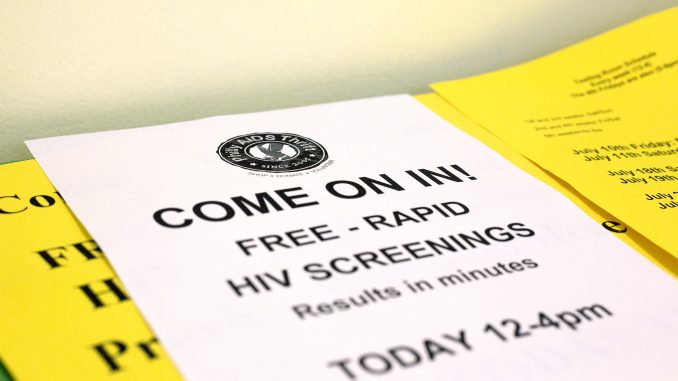
As speakers blare music throughout the thrift store on South Fifth Street, staffers move about the sales floor reorganizing donated inventory into item-specific departments.
Used books are shelved by the “Cafe,” and a collection of secondhand clothing hangs from racks in “The Dollar Dead End.” Tucked away beside a corner overflowing with Christmas decorations sits a small waiting room unrelated to the pursuit of bargain buys.
Philly AIDS Thrift, a nonprofit thrift store located in Philadelphia for the past ten years, now houses an HIV testing clinic on its second floor where shoppers can stop in to learn their status.
This clinic is only the newest effort made by Philly AIDS Thrift to fight against HIV/AIDS. According to co-founder and co-manager Christina Kallas-Saritsoglou, the thrift store donates its profits from selling secondhand merchandise to the AIDS Fund, which then distributes the money to multiple HIV/AIDS service organizations in the Philadelphia area, such as Calcutta House, The Attic Youth Center and AIDS Law Project of Pennsylvania.
“Outside of staff and operating costs, we give all of our proceeds to the AIDS Fund,” Kallas-Saritsoglou said. “At this point, we give them $20,000 a month.”
Philly AIDS Thrift has thus far donated over $1 million in total.
Now, the store is combating HIV/AIDS with a more direct approach through their “free, rapid” testing clinic, which opened at the end of June, just in time for national HIV Testing Day on June 27.
Kallas-Saritsoglou hopes that the store’s relaxed, non-traditional clinic setting normalizes testing and encourages people to know their status.
“All the [HIV testing] places that exist already [are] awesome,” Kallas-Saritsoglou said. “[But] there’s some places that everybody knows what you’re doing when you go there. So we kind of wanted to create this thing where it’s just very comfortable.”
Philly AIDS Thrift currently offers testing from noon to 4 p.m. on every Saturday and Sunday during the first and third weeks of each month, and on every Friday and Saturday during the second and fourth weeks. A second time slot will also be added to the fourth Friday of each month from 5 p.m. to 9 p.m.
Testing is administered through Philly AIDS Thrift’s five different partner organizations: GALAEI, BEBASHI, ActionAIDS, Mazzoni Center and Philadelphia FIGHT.
Counselors are also prepared for readiness, so that if someone does test positive for HIV, they can receive care immediately.
Tommy Atz, HIV tester from GALAEI, administered testing on past weekends, and said that the process for getting tested is quick and easy.
“[We] prick someone’s finger, we get a little bit of blood, [and] we put it in the container,” Atz said. “Within 10 to 15 minutes, an individual can know their HIV status.”
Young people today who did not experience the AIDS epidemic of the 1980s do not fully understand the suffering related to this disease, Atz said, and thus the importance of knowing your status.
“To get a test for HIV is to decide that ‘yes, I’m going to think about this issue and I’m going to remember that this is still going on,’” Atz said.
While trained professionals handle testing, a volunteer outreach team takes to the streets.
Angela Moscoso serves as co-leader to a team of just fewer than 10 volunteers who alert passersby of available testing and hand out pamphlets and condoms.
“We have people who are actually going outside the store, out on South Street and they’re trying to spread the word,” Moscoso said.
Volunteers on the outreach team complete a training process before approaching people, as some are more receptive than others.
“Our society in general isn’t always so comfortable talking about sex or sexuality,” Moscoso said. “So the training is really getting people [to understand] what the outreach entails.”
Talking about HIV and getting tested can also be a touchy subject in today’s society, Kallas-Saritsoglou said.
“Sometimes there [are] still stigmas attached to [HIV], like ‘Oh, it’s a gay disease.’ It’s just simply not true,” Kallas-Saritsoglou said.
Philly AIDS Thrift encourages people to learn their status.
“I think it’s just really important for us to know our status [and] to take control,” Kallas-Saritsoglou said. “People live long healthy lives with HIV, as long as you know it, as long as you’re taking care of it.”
Jennifer Roberts can be reached at jennifer.roberts@temple.edu



Be the first to comment